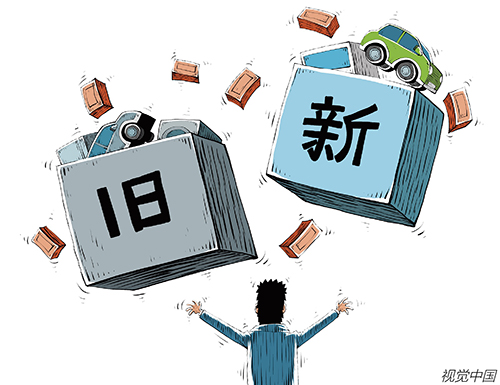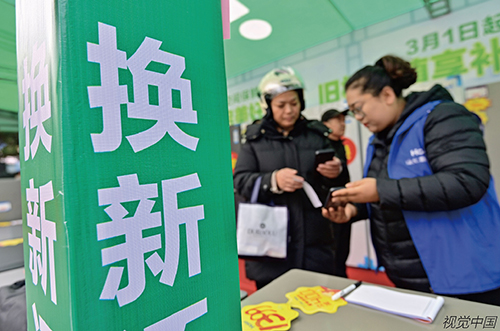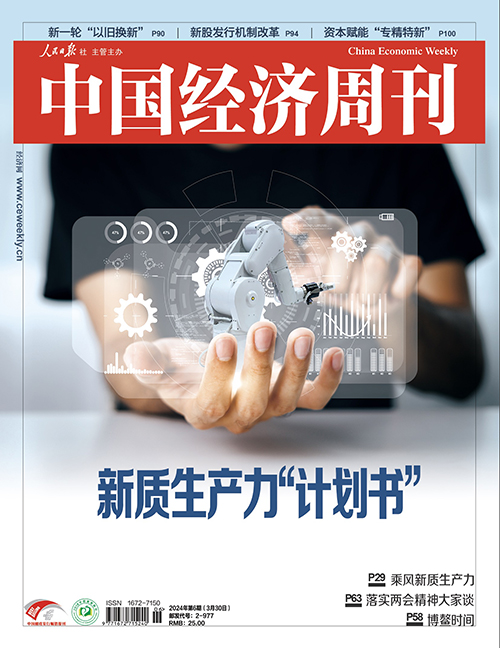China Economic Weekly reporter Guo Zhiqiang reported from Beijing.
The 2024 government work report proposes to stabilize and expand traditional consumption, encourage and promote the trade-in of consumer goods, and boost the mass consumption of intelligent networked new energy vehicles and electronic products.
As early as March 1st, Premier Li Qiang of the State Council presided over the the State Council executive meeting, which deliberated and adopted the Action Plan for Promoting Large-scale Equipment Renewal and Trade-in of Consumer Goods. The meeting pointed out that promoting a new round of large-scale equipment renewal and trade-in of consumer goods is a major decision made by the CPC Central Committee with a view to China’s overall high-quality development.
On March 13th, the relevant person in charge of the National Development and Reform Commission said that promoting large-scale equipment renewal and trade-in of consumer goods can continuously increase the proportion of advanced production capacity, so that high-quality durable consumer goods can enter residents’ lives more, which can not only promote consumption, stimulate investment, but also increase advanced production capacity, improve production efficiency, and also promote energy saving and carbon reduction and reduce potential safety hazards. It can be said that it will benefit enterprises and benefit the people.
"China has entered a new round of steady growth policy, and promoting large-scale equipment renewal and trade-in of consumer goods is a part of the policy combination boxing." Song Xuetao, chief macro analyst of TF Securities, told the reporter of China Economic Weekly.
Song Xuetao believes that there are three main aspects of the logic behind it: First, after the changes in traditional infrastructure and real estate, expanding manufacturing investment and expanding domestic demand are becoming new stable growth targets; Second, under the background of high-quality development, promoting large-scale equipment renewal in key industries is conducive to promoting industrial transformation and upgrading and improving economic growth potential; Third, give play to the traction function of energy consumption and other standards, and emphasize the establishment and improvement of recycling system, which is the implementation of green environmental protection goals.

What’s the difference between the new round of "trade-in"
In fact, the Central Economic Work Conference held at the end of 2023 proposed to promote large-scale equipment renewal and trade-in of consumer goods by improving standards such as technology, energy consumption and emissions.
On February 23, the fourth meeting of the Central Committee of Finance and Economics emphasized that accelerating product upgrading is an important measure to promote high-quality development, and it is necessary to encourage and guide a new round of large-scale equipment upgrading and consumer goods trade-in.
Then, on March 1st, the the State Council executive meeting deliberated and adopted the Action Plan for Promoting Large-scale Equipment Renewal and Trade-in of Consumer Goods.
On March 13th, the State Council issued the Action Plan for Promoting Large-scale Equipment Renewal and Consumer Goods Trade-in (hereinafter referred to as "Action Plan"), which shows that the action plan has made a comprehensive arrangement for promoting large-scale equipment renewal and consumer goods trade-in, focusing on four major actions: equipment renewal, consumer goods trade-in, recycling and standard improvement.
A number of market analysts revealed that with the new round of large-scale equipment renewal and the deployment of the trade-in policy for consumer goods, this year’s consumption promotion policy will be launched in advance in key areas, which will push through the difficult points of trade-in.
In the past 10 years, China has experienced actions such as home appliances going to the countryside, cars going to the countryside, and home appliances being replaced with new ones. What is the difference between the new round of "trade-in" and the past?
Yuan Chuang, general manager of Caixin Securities Research and Development Center, told the reporter of China Economic Weekly that in recent years, the local commerce, finance and other relevant departments encouraged consumption by means of coupons, but the actual effect was different from the expectation. It is expected that this round of trade-in measures will change from the small-scale support of local governments to the linkage between the central and local governments, and stimulate consumers in a more direct and beneficial way, thus achieving the effect of truly boosting consumption.
Song Xuetao believes that "compared with the trade-in of consumer goods mentioned in the previous policy, we believe that this round of trade-in has four new ideas. First, technological progress is more conducive to encouraging residents to trade in old ones for new ones; Second, the potential market for trade-in is greater. With the increase in the number of durable consumer goods such as automobiles held by residents, there is more room to promote trade-in among residents. Third, when emphasizing the trade-in of old equipment, the policy also emphasizes the need to establish and improve the recycling system, promote the remanufacturing of used equipment and improve the level of resource recycling; Fourth, in the case of changes in traditional grasping effects such as real estate investment, expanding domestic demand through trade-in and other means has been placed in a more important position. "
Promote large-scale equipment renewal and release industrial demand.
The executive meeting of the State Council pointed out that we should give full play to the traction function of standards on energy consumption, emission and technology, and promote the renovation and transformation of equipment in key industries, construction and municipal infrastructure, transportation equipment, old agricultural machinery, education and medical equipment in an orderly manner.
Specifically, the action plan focuses on seven major areas, including industry, agriculture, construction, transportation, education, cultural tourism, and medical care, and promotes the upgrading of equipment in key industries. In combination with the promotion of urban renewal and the transformation of old residential areas, we will promote the upgrading of equipment in the fields of construction and municipal infrastructure, support the upgrading of transportation equipment and old agricultural machinery, promote the upgrading of equipment in the fields of education, cultural tourism and medical care, and promote the production and application of more advanced equipment.
The China Gold Research Report believes that from the perspective of equipment renewal, the policy is beneficial to two directions. One is the traditional industry based on the replacement cycle and the existence of technological upgrading; Second, advanced productive forces that conform to the long-term development trend and have long-term value.
On March 6th, at the economic press conference of the Second Session of the 14th National People’s Congress, Zheng Shanjie, director of the National Development and Reform Commission, cited equipment as an example. Last year, the investment scale of equipment in key areas such as industry and agriculture in China was about 4.9 trillion yuan. With the deepening of high-quality development, the demand for equipment renewal will continue to expand, and it is estimated that it will be a huge market with an annual scale of more than 5 trillion yuan.
For large-scale equipment renewal, Yuan Chuang also interpreted it from the perspective of new quality productivity: "The demand for equipment renewal in the production field is conducive to promoting the cultivation and construction of new quality productivity in industries such as steel and new materials."
Song Xuetao said that an important feature of the new round of large-scale equipment renewal and trade-in of consumer goods is to adhere to the guidance of standards and give better play to the traction of standards such as energy consumption, emissions and technology.
In February this year, the National Development and Reform Commission and other departments issued the Advanced Level of Energy Efficiency, Energy Saving Level and Access Level of Key Energy-using Products and Equipment (2024 Edition), which divided the energy efficiency level of energy-using products and equipment into advanced level, energy saving level and access level. Guide all regions and related enterprises to implement product and equipment renovation, encourage them to reach the level of energy efficiency and energy conservation after renovation, and strive to reach the advanced level of energy efficiency.
In addition, CICC Research also believes that the demand for equipment renewal in old industries and the expansion of advanced production capacity will benefit from this round of "trade-in" policy opportunities. For example, ships, coal machines and rail transit industries are in the upward cycle of replacement at the life level. If there are further policy incentives, the demand for partial replacement can be stimulated or pre-arranged.
Zheng Shanjie said that with the deepening of new industrialization, the demand for advanced equipment is still growing. We will focus on energy saving and carbon reduction, ultra-low emissions, safe production, digital transformation and intelligent upgrading to promote the upgrading of equipment in key industries.

Who will benefit from the "trade-in" of consumer goods?
The executive meeting of the State Council pointed out that we should actively carry out the trade-in of consumer goods such as automobiles and household appliances, and form the scale effect of upgrading.
Bulk consumption such as automobiles and household appliances is an important focus for expanding domestic demand. The action plan is clear: trade-in of durable consumer goods such as automobiles, household appliances and homes will be carried out, the consumption of automobiles will be promoted step by step and updated, and the national promotion activities for trade-in of automobiles will be organized to eliminate old automobiles that meet the mandatory scrapping standards according to laws and regulations.
"Promoting the trade-in of consumer goods is not only a powerful measure to enhance the current economic growth momentum and consolidate the recovery, but also a long-term strategy to promote high-quality development." At the economic theme press conference of the Second Session of the 14th National People’s Congress, Minister of Commerce Wang Wentao said that promoting the trade-in of consumer goods such as automobiles, home appliances, home improvement and kitchen and bathroom is one of the key tasks to promote consumption this year.
Wang Wentao said that China’s potential renewal demand has entered a concentrated release period. Taking automobiles as an example, there are more than 16 million passenger cars with emission standards of Grade III and below in use, of which more than 7 million are over 15 years old; On average, about 270 million household appliances exceed the safe service life according to the standard every year.
Everbright Securities Research Report shows that according to the scrapping rate of 5% per year in 20 years, the number of scrapped cars in China has reached 16.8 million in 2023; The number of household appliances scrapped is also on the rise, and it is expected to exceed 200 million units in 2022. In recent years, the scrap volume of household appliances and automobiles has gradually increased, and the market potential is huge.
According to the data of the Ministry of Commerce, in 2023 alone, there will be about 340 million cars, and more than 3 billion household appliances such as refrigerators, washing machines and air conditioners. Some household appliances have been used for more than 10 years and 20 years, and the demand and potential for upgrading are great.
According to Yuan Chuang’s analysis, in 2009, the "trade-in" policy for automobiles and household appliances was introduced. After about 10 years of natural product life and renewal cycle, combined with the impact of the epidemic, it is expected that a centralized trade-in cycle will be formed from 2021 to 2025. At present, the home appliance industry has become a stock market. How to increase the policy of trade-in and landing effect requires the joint efforts of many parties to promote support.
Recently, Ms. Lin from Hunan replaced a number of household appliances such as air conditioners, washing machines and water heaters with old ones, and spent a total of more than 6,000 yuan, many of which were converted into cash after 10 years of use, and were successfully recycled by manufacturers.
Ms. Lin told the reporter of China Economic Weekly: "It turned out that these old household appliances were sold as waste products. Now, manufacturers have special people to dismantle and recycle them. Although they are not converted into much cash, we have great motivation to change them, because this is just the need of family daily life." In addition, Ms. Lin and her family are still planning to dispose of the fuel vehicle at home and replace it with a new energy vehicle.
Yuan Chuang also said that in addition to the growth potential of home appliances, cars are also facing great opportunities. After the sales volume of passenger cars peaked in 2017, the proportion of replacement demand gradually increased. Driven by the trade-in policy, the sales volume of independent brands has strong certainty. At the same time, the active replacement policy is expected to promote consumers to replace more advanced models, and the profitability of automobile enterprises is expected to be improved.
Yuan Chuang also predicted: "Domestic automobile sales are expected to be greatly boosted, and the follow-up needs to continue to track the implementation of specific policies."
Zheng Shanjie said that it is a systematic project to promote large-scale equipment renewal and trade-in of consumer goods, and it is necessary to do a good job of policy combination boxing. We will, together with relevant parties, increase financial, financial and taxation policy support, strengthen the protection of land use, energy use and other factors and the support of scientific and technological innovation, carry out the "four major actions" in depth, do practical things well and do good deeds, and solidly promote high-quality economic development.
(This article was published in China Economic Weekly, No.6, 2024)

关于作者